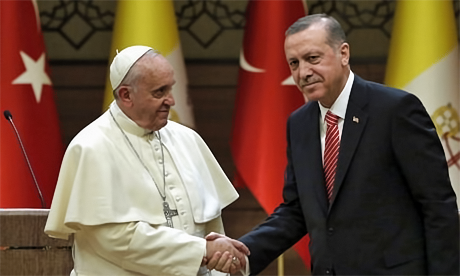The plight of Christians in the Middle East and Muslims in the West dominated Pope Francis’ first day in Turkey.
Both the Pope and Turkish leaders spoke frankly about their respective concerns.
“It is essential that all citizens – Muslim, Jewish and Christian – both in the provision and practice of the law, enjoy the same rights and respect the same duties,” the Pope said November 28 in a speech to President Recep Tayyip Erdogan and other officials at the presidential palace.
“Freedom of religion and freedom of expression, when truly guaranteed to each person, will help friendship to flourish and thus become an eloquent sign of peace.
“Commitment to such freedoms is essential to countering fanaticism and fundamentalism, as well as irrational fears which foster misunderstanding and discrimination,” he said.
Pope Francis strongly condemned the “barbaric violence” perpetrated against Christians and other minorities in Syria and Iraq, however stressed an eye-for-an-eye violence in return will not solve the problem.
“In reaffirming that it is licit, while always respecting international law, to stop an unjust aggressor, I wish to reiterate, moreover, that the problem cannot be resolved solely through a military response.”
The Holy Father described the humanitarian situation in Syria and Iraq as “unbearable” and pointed the finger mainly at extremist fundamentalist groups.
Speaking in the vast auditorium of Turkish president Recep Tayyip Erdoğan’s palace in Ankara, Francis lauded Turkey for hosting large numbers of Syrian refugees, and reminded the international community of their “moral obligation” to help care for the almost 2 million Syrians living within Turkish borders.
He also called for an increase in religious tolerance and the tackling of fundamentalism by relieving hunger, poverty and marginalisation, and not by military interventions alone.
“What is required is a concerted commitment on the part of all, based on mutual trust, which can pave the way to lasting peace, and enable resources to be directed, not to weaponry, but to the other noble battles worthy of man: the fight against hunger and sickness, the promotion of sustainable development and the protection of creation, and the relief of the many forms of poverty and marginalisation, of which there is no shortage in the world today,” the pope said.
Islamophobia a rising Western problem
For his part, Turkish President Recep Tayyip Erdogan raised the issue of prejudice and intolerance against Muslims in other countries, stating that “Islamophobia is a serious and rapidly rising problem in the West”.
He lamented “attempts to identify Islam with terrorism hurt millions.”
In a strongly worded warning against growing Islamophobia in the world, Erdogan said that Islamophobia risked further dividing Muslims and Christians.
“Islamophobia is rising seriously and rapidly. We must work together against the threats weighing on our planet — intolerance, racism and discrimination,” said Erdogan.
Religious violence is ignorance
Former grand mufti of Istanbul, Mustafa Cagrici, who famously welcomed Benedict XVI to the Sultan Ahmed Mosque, and during which, he and Benedict shared a moment of prayer facing Mecca, described Pope Francis’ visit as “Symbolically, an important gesture of peace that the pope is coming to, and being welcomed by, an Islamic country.”
“It’s true, both the Quran and the Bible have passages that justify violence,” said Cagrici, the former head of religious affairs for Istanbul, and respected figure among the Turks..
“But there are many more arguments for peace. Violence done in the name of religion is rooted in ignorance,” he said.
Sources
- CNS
- The Guardian
- Crux
- UCANews.com
- Image: SCMP
